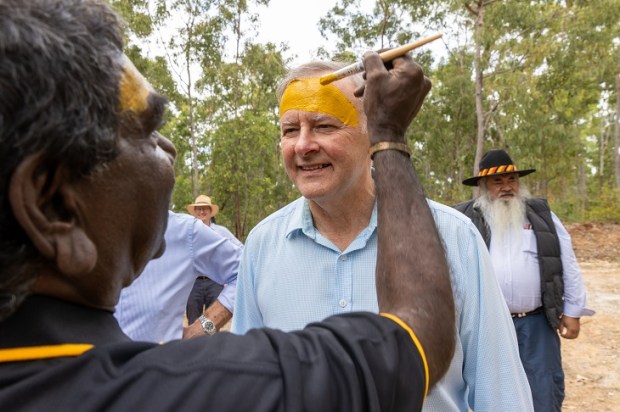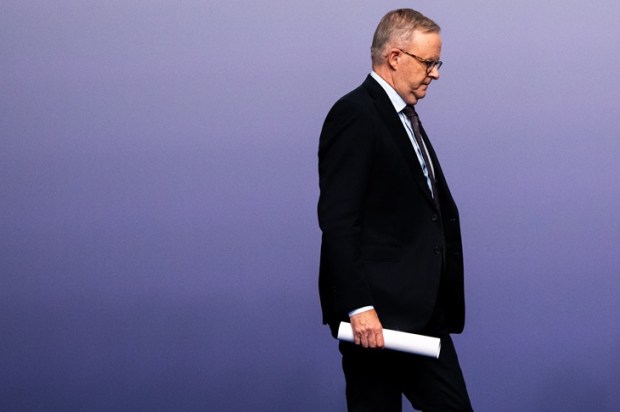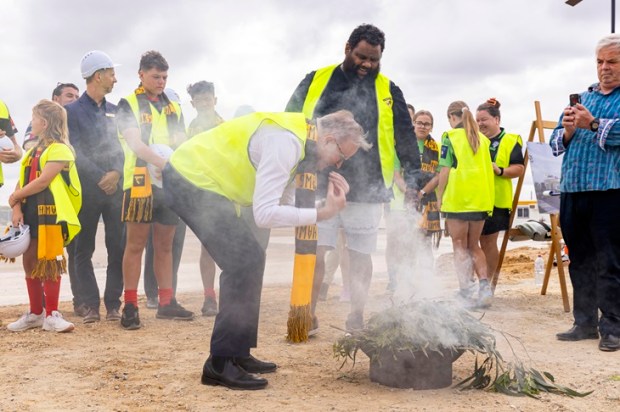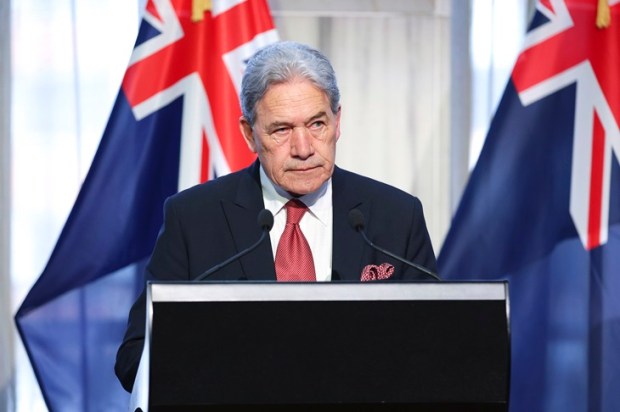At a recent packed-out ‘No’ event in Ballina (New South Wales), Jacinta Price received a standing ovation on arrival, and also at the end, and there were lots of applause lines in between.
Price is emerging as a compelling ‘Voice’ for common sense and Australian values. It is the latter that is noteworthy, and refreshing. She sounds more upbeat about Australia than I do, that is for sure. I think the place is pretty ordinary these days, both in its polity and in its culture. Perhaps Price was talking about an Australia now gone, but I don’t think so. I think she is still fervent in her optimism about the prospects and potential of the once-lucky country.
It is ironic that it is an Aboriginal person who is saying these positive things about the country. Aren’t they supposed to be dispossessed and grumpy? Instead, there are many others of us who feel dispossessed and grumpy these days. Like the one-third of voters who don’t support either branch (Labor or Liberal) of the UniParty. Who routinely get policies that they loathe visited upon them. Like giving one hundred million dollars to the World Health Organisation. Like Covid vaccine mandates and lockdowns. Like digital ID. Like WHO pandemic oversight. Like mass immigration. Like the ‘1984’ (online ‘safety’) bill now before the Parliament. Like a trillion dollars Covid debt and the money printing that is driving a cost-of-living crisis. Like having their taxpayer dollars wasted on vanity projects and Wokedom. Like the endless lecturing by ministers and their ideological buddies. Like banning gas heaters. And cars! Did they ever ask our permission for this? Do they ever say sorry – for anything they do to us? No, their most grievously evil actions are simply flushed down the increasingly used memory hole.
No, Jacinta is one of life’s glass-half-full types, and all credit to her and all the other people, whether black or white, who live post-colonialism realistically and without endless bitterness. The post-colonialism about which two things are clear. First, European modernity brought massive and recurring benefits to colonised peoples. Second, we can’t do anything now about what happened in 1790 except move on and seek always to treat one another with respect and look after those who are struggling the most.
We often hear these days, especially in the wake of Albanese’s clearly disastrous decision to hold the Voice referendum, that Australia is ‘divided’. Indeed it is, and although the present prime ministerial incumbent has done more than his share of heavy lifting in dividing us, he isn’t the only one to have contributed. Given that the UniParty branches share so many ideological obsessions, it is (again) ironic that they seem so keen on dividing the rest of us. We are not divided over race. Covid policy divided us into elites and deplorable anti-vaxxer conspiracy theorists. City-centric governments routinely divide us into urban and regional, and the latter are simply parked unless there is a marginal electorate up for grabs. (Just think of the contrast when, a few years ago and a fire broke out on the North Shore of Sydney and, with minutes, super helicopters were spraying fire retardant everywhere, and the Lismore flood where, nearly two years on, there is still no help for those who need it most.) Virtue signallers invariably bespeak division, explicitly or implicitly, every time they shout their moral superiority.
Yes, we are divided. Just like the Brits, pre- and post-Brexit. But, more than this, we are very, very cranky. There now seem to be, in Australia, far shorter fuses and much more angst. There is now default-angst. Bullying by the political class will do that. As will routinely breaking promises. As will arrogantly assuming support for policies introduced without the remotest electoral mandate.
This ill-temper can be seen in all sorts of places. Graffiti on ‘No’ posters. The visceral anger of the gaslit unvaxxed, whose unassuaged crankiness will only ever go away in the event of an apology. Audible accusations of ignorance when ‘No’ voters don’t take a ‘Yes’ how-to-vote card. (Happened today.) Road rage over minor matters, or perceptions of driver-bullying by other road users. (Apparently, Australia leads the world in tailgating.) Just today, I witnessed a pedestrian at the local shopping village flipping the bird at a driver ho, probably through non-side-vision, or minor thoughtlessness at worst, failed to stop at the pedestrian crossing. These are symptomatic of a grumpy country.
Then there is the quiet, unexpressed anger of the excluded. Sam Newman apparently invited footy fans to boo the welcome to country at the AFL grand final. I don’t know if any or many did. You would risk being thrown out if you did that. But I am equally certain that many people would have wanted to. It is the same with the lack of visible ‘No’ support, seen in posters and tee shirts. The silence of the ‘No’ voters is, of course, in inverse proportion to the actual intention to vote ‘No’. Who wants exposure to yet more abuse and bullying?
There has been some analysis of the silent anger. For example, the London Daily Telegraph headlined recently:
[The] Fury of the silent majority is driving a global Right-wing counter-revolution.
Its columnist, Allister Heath, argued:
These are not happy times. Across the West, the vast majority of voters are fed up with the status quo, furious at the political class and desperate for alternatives. They believe society to be broken, that the post-industrial economy and globalisation generally aren’t working for them, and are angry at the vast cultural, social and technological changes that they feel have been foisted upon them.
Almost wherever one looks, from New Zealand to the Netherlands, hundreds of millions no longer feel in control, valued or even consulted by the self-satisfied ruling class. In the UK, 70 per cent believe the country is moving in the wrong direction, a YouGov poll reveals. An NBC poll found 74 per cent of Americans saying their country is on the wrong track.
An American news source noted in 2021:
Americans are an easygoing lot. We let bygones be bygones. If crazy Uncle Bob wants to rattle on at Thanksgiving dinner about global warming in the middle of the coldest winter in twenty years, we politely ask for more cranberry sauce.
We have been known as ‘the silent majority’. We vote pretty often, but we don’t donate to politicians or volunteer on campaigns. And we certainly don’t protest at City Hall.
But this good nature is predicated on our government playing by the rules and staying out of our lives. (Watch the fun when someone from the government knocks on our door and offers to help.) We’re old enough to have been taught about the Constitution and the Bill of Rights in school, and we know that without fair and consistent rules, a successful society can’t exist.
So when we see a systematic assault on our American rights that has a major impact on our daily lives, we start to wake up. And when it continues, we start to get angry.
… It looks as if the silent majority is finally seeing the writing on the wall. We are realising that if we do nothing when the government comes for our neighbour, then there will be no one left to help when the government comes for us.
Three key phrases are, playing by the rules, staying out of our lives and a systematic assault. This troika of causes of our current anger management issues is now baked-in to the style of government inflicted on us all.
For some, this all had its source in a (little remembered today) revolution in government in the 1990s that followed the adoption of the principles outlined in the then-popular tome, Reinventing Government, written by David Osborne and Ted Gaebler. Nick Greiner and Wayne Goss, worshippers at the altar of the so-called New Public Management, were early adopters in Australia. Speaking about the book in a consequential article in First Things, the outstanding American analyst-scholar, Christopher Caldwell, has noted the following:
The lesson, which the authors never explicitly enunciated, leaps off the page: Government doesn’t work because it is democratically accountable to voters. Notwithstanding its anodyne title, Reinventing Government was a rough, tough, cutthroat set of case studies about what bureaucrat heroes could accomplish if they were only ruthless enough to put the voting public in its place.
… Osborne and Gaebler introduced a new vocabulary to bureaucrats around the world when they wrote: ‘We need better government. To be more precise, we need better governance.’ Government is about rulers’ relationship to the ruled – it is constitutional accountability. Governance is about rulers’ relationship to their projects – it is business accountability.
… A good many functions that government had never previously thought to administer now became its business.
… No longer would the public set the government’s priorities, the government would set the public’s. (Emphasis added).
But governments are not businesses. It turns out that government didn’t need to be re-invented, at least not in the way championed by Osborne, Gaebler, and their acolytes. Another, now sinister, word – technocracy – springs to mind when describing the new forms of control. The Canadian Julius Ruechel sees another angle and adds to Caldwell’s analysis:
One of the most destabilising aspects of the chaos of the past few years is that the pillars of society – our democratic and academic institutions, along with our courts, media, police, doctors, corporate giants, and thought leaders – have not only been unable to resist the postmodern deconstruction of society but have become active perpetrators in a war on reality that is turning classical liberal democracy into a grotesque parody of itself.
This sidelining of voters is nothing less than a revolutionary top-down assault on democracy. And it pretty well sums up the state of government in Australia. And it explains the anger. The now departed Daniel Andrews is merely the most brazen and egregious example of a pretty common phenomenon down under aka the ‘nothing-can-touch-me’ politician. Hubris and overreach. And then they, not we, decide when they are to go.
The silent Australians, whether designated as Howard battlers, as our equivalent of Reagan Democrats or as some other descriptor, are now very much the silent, angry Australians. It is hard to measure a negative. But I am guessing that the outsized number of informal voters and non-voters seen at recent elections is merely one indicator of this new phenomenon. Another is the non-negligible support for minor parties. Then there is the emergence of the alt-media, like ADHTV, the podcasters (like John Anderson), the substack-powered independent journalism of people like George Christensen and Rebekah Barnett (Dystopian Down Under), and the creation of, and support for, new Australian bases for non-political institutions, like RF Kennedy Jr’s Children’s Health Defense.
Sometimes the protests aren’t so silent. Possibly half a million freedom fighters descended on Canberra in February 2022, in convoy, to speak out for the Covid deplorables. No one was listening to them. Perhaps they were too polite.
When the political class and its noisy acolytes in the public broadcaster, the legacy media more broadly, the corporates, the churches and the NGOs stop the disrespect – to use one of its favourite words – and attempt to be more ‘inclusive’ of the silent-but-angry – to use another – then we might begin the process of re-uniting as a nation. A process that at least one Aboriginal leader is seeking to kick-start. I don’t think there is much evidence, yet (and sadly), of this happening anytime soon.
No, on the contrary, post-Covid, there is only evidence of doubling down on the bullying. Apart from the absence of any apology, apart from the memory-holing, we have fresh, ramped-up assaults on the citizenry. Pandemic planning, the off-shoring of future pandemic decision-making, digital IDs, further extensions of the censorship industrial complex, and the willful destruction of our fossil-fuel-anchored economy. Made-up electoral mandates. And the rest.
We are still angry. It is simmering, and the voice referendum outcome might, just might, wake a few people up to what is going on very close to the surface. But more than silent anger is required to shift public opinion back towards the relentless holding of bad (or worse) governments accountable for their actions and inactions. We need to hit the magic 10 ten per cent (of the people) performing voluble and persistent public dissent, as urged on us by Ruechel.

























